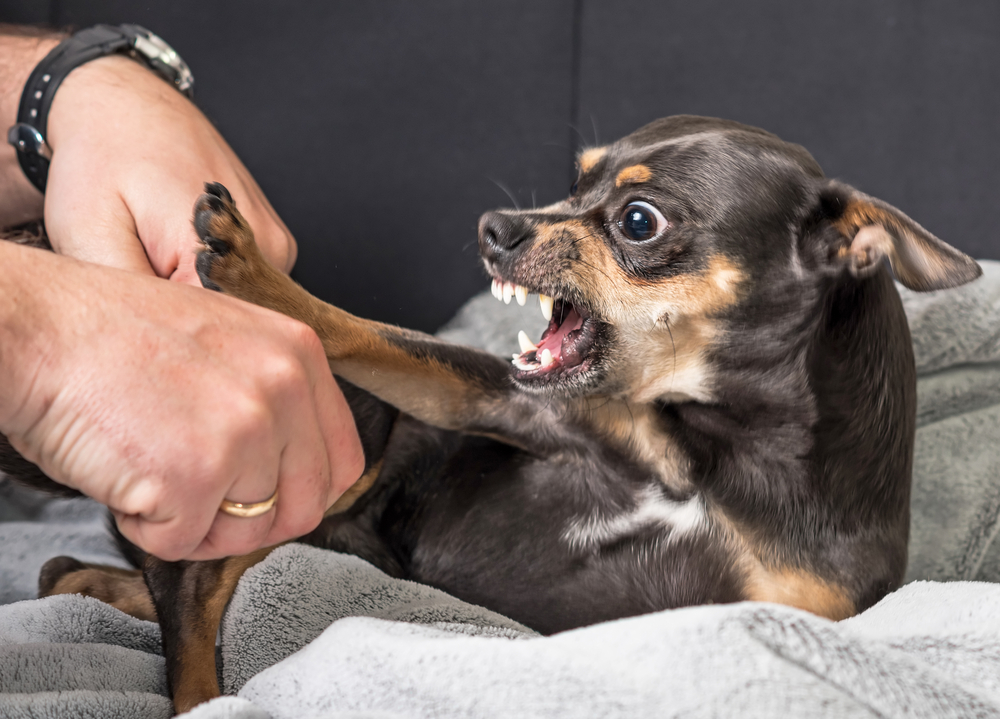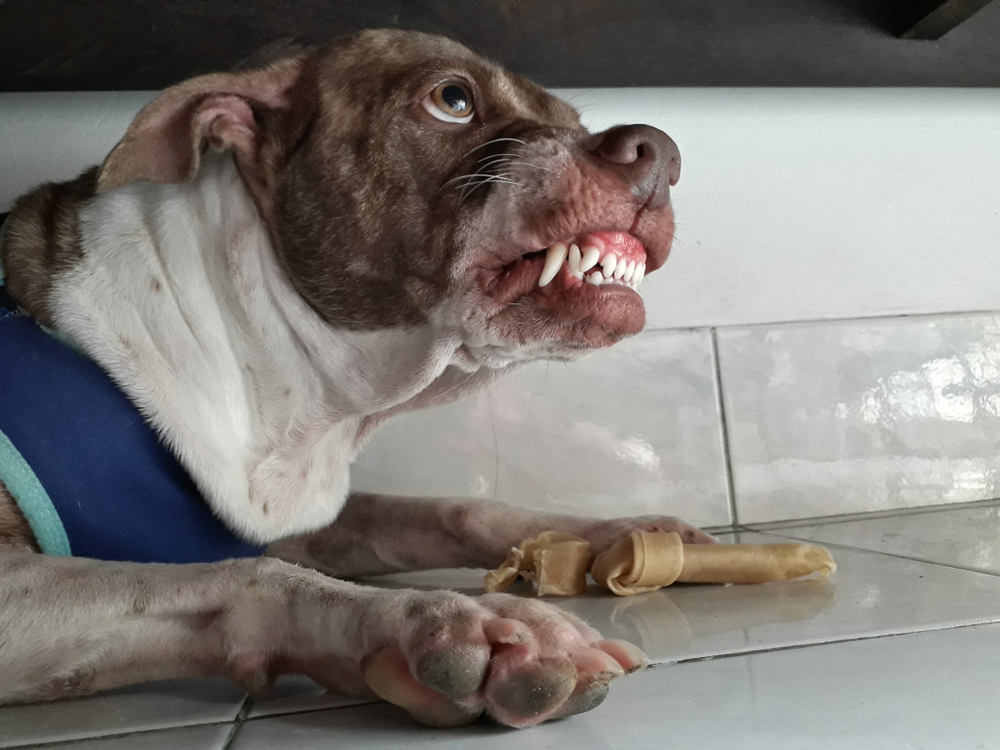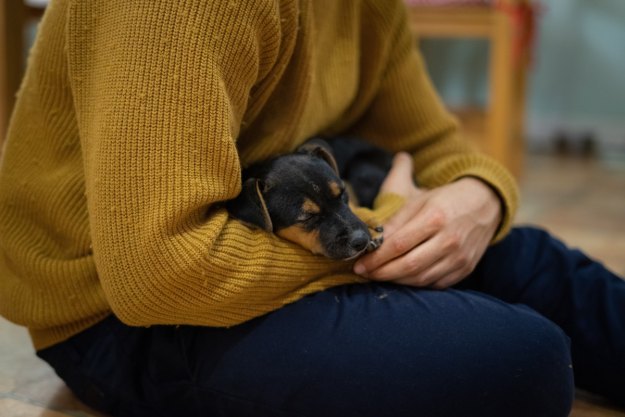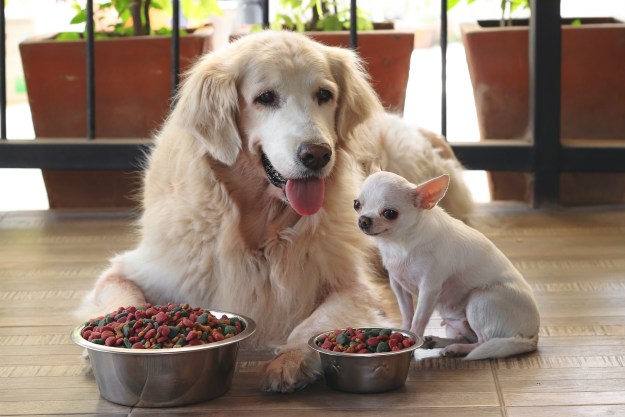In today’s tumultuous society, having a guard dog can be a comfort. Without question, it’s nice to own a live-in protector who not only announces when strangers are at the door but also makes it clear he won’t tolerate any funny business from those outside the immediate family.
But what happens when that same protector becomes aggressive toward members of the family? Whether your dog has always been a bit moody, or the behavior comes on suddenly growling, barking, snarling, and lunging — even biting — can cause emotional as well as physical harm to other pets or humans living in your household and must be addressed. Here’s why some dogs are aggressive toward their owners and what you can do about it.

What might be causing the aggression?
There are a variety of reasons why your dog may be displaying aggressive behavior toward you or other family members.
Fear. Dogs who feel threatened may exhibit aggressive behavior as a form of self-defense, especially if the aggression has been successful in preventing scary situations. If your dog is fearful, refrain from punishing him when he is aggressive. Doing so will only make him more fearful. Instead, learn your dog’s body language so you can remove him from the situation before it occurs. Work on basic obedience skills so you can redirect your pup in a positive manner. And ask your veterinarian to recommend supplements that may help reduce his fear or anxiety.
Illness. If your dog suddenly becomes aggressive or moody without warning, it might signal an underlying medical condition that needs to be addressed. Older dogs especially can suffer from a variety of diseases, including joint pain and cancer, that cause significant pain. Depending on the diagnosis, your veterinarian may prescribe anti-inflammatories or pain relievers to help alleviate the symptoms. Knowing the diagnosis will also help family members understand the reason for your pet’s discomfort so they can change their interactions with him accordingly.
Neglect. Some neglected dogs react aggressively toward people or animals, especially when food is involved, they perceive they are being threatened, or their abuser is nearby. Speaking in a calm voice and establishing safe places in your home where they can feel safe are important steps in dealing with aggressive behavior in an abused dog.
Improper discipline. Dogs who have been disciplined with yelling, leash yanking, and other forms of physical punishment can become fearful and, as a result, develop aggressive behavior.

Can the aggressive behavior be changed?
Possibly. It really depends on why your dog is acting aggressively in the first place, the severity of the aggression, and what steps you’re willing to take to keep the dog as a family member. Changing this behavior will take time and patience and may include a mixture of the following methods.
Behavior therapy. Your veterinarian may recommend seeking help from a dog behaviorist, who has specialized training in canine conduct. These college-educated professionals can assess why your dog is behaving aggressively and suggest ways in which you can change the behavior.
Medication. Dogs who are exhibiting aggressive behavior because of a medical condition, such as cancer, osteoarthritis, or anxiety, may benefit from medications designed to treat their symptoms.
Exercise. Dogs who don’t get a daily dose of mental and physical exercise might expend their pent-up energy in a negative, aggressive manner. As a general rule, most healthy adult dogs need a minimum of 30 minutes to two hours of activity each day. Talk with your veterinarian about the amount of exercise that’s best for your dog. Consider investing in some puzzle toys that stimulate your dog’s mind, too.
Where to go from here
The first place to start is to consult your veterinarian. They will examine your pet thoroughly to determine whether there are any underlying medical conditions that might be causing the problem and if so, prescribe a course of treatment. If your pup is given a clean bill of health, your vet might recommend working with a dog behaviorist to determine the cause of your dog’s aggression.
If your dog has become a beloved member of the family, as they do in most, it’s understandably difficult to bear the thought of rehoming or euthanizing him. Realize that changing his aggressive behavior will take a long time — possibly years — with no guarantee that he’ll ever be completely reformed. With patience and proper guidance, however, you can manage the situation to ensure the welfare of your pet as well as those who live with him.
Editors' Recommendations
- How long do dachshunds live? The truth might surprise you
- Are ‘dog years’ really 7 human years? How to calculate your dog’s age
- Why does my dog have a bald patch on their tail? Here are the answers you need
- Looking for signs your dog has ticks? These telltale symptoms mean you have a flea or tick problem
- Is your dog barking nonstop? Here’s how to get your noisy pup under control



